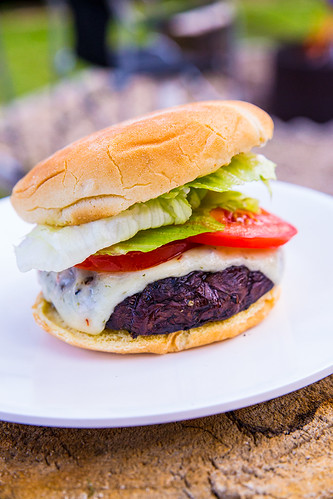Ic restriction. Hoffmann et al. [62] did not find any correlation between lipid reserves and starvation resistance among isofemale strains derived from wild populations, either within or across populations, whereas Baldal et al. [67] observed that raising larvae under crowded conditions increases the adult fat content without improving starvation resistance. Therefore, storing more reserves is a common adaptation to starvation in laboratory experiments but higher lipid content does not lead to greater starvation resistance.Heat ToleranceWe found that flies developed on protein enriched medium have higher heat resistance than flies grown on carbohydrate enriched medium. Very few flies developed on carbohydrate rich diet have revived after heat shock. Flies developed on protein rich diet cope up with heat shock faster than flies developed on carbohydrate ich diet. The physiological explanation for an increased heat knockdown tolerance among flies developed on protein enriched medium is unknown. One possibility may be related to the induction of heat shock proteins which are known to be important for coping with several stress types [29,68,69,70,71,72]. Anderson et al. [48] reported that Hsp 70 is upregulated in flies developed on protein enriched medium compared to in flies developed on protein deficient medium.Life History TraitsWe found a higher females’ developmental success on proteinenriched medium while males’ developmental success was higher on carbohydrate enriched medium. This shows that two sexes have different requirements CAL 120 custom synthesis during development and growth. Our results are consistent with the findings of Anderson et al. [48] (2010) which prove that Drosophila spp. have similar type of sex specific requirements. Previous studies show that Drosophila melanogaster MedChemExpress NT 157 females accumulate more lipid but less protein relative to body mass compared to males [73], while females need to build protein for ovaries [17,18] males accumulate protein to build up muscles mass for activity during courtship. Sex ?specific responses in life-history traits are well-known from other studies on Drosophila melanogaster [74,75,76].Egg production in females developed on protein enriched medium is higher than females developed on carbohydrate enriched medium. A high protein requirement when producing eggs might reflect that synthesis of the egg-yolk protein vitelline in females is dependent on the incorporation of amino acids [15,17]. The interesting finding  of this study is that flies evolving under protein rich condition had reduced egg to adult viability suggest a trade-off between egg to adult survival and egg production. This trade-off could suggest that a limiting shared resource is divided between the two traits. However, the trade-off was found on both diet types. Thus it is more likely that the trade-off is caused by antagonistic pleiotropy. Kristensen et al. [76] found trade-off between egg to adult survival and body mass in protein rich diet in Drosophila melanogaster. They also explained that this event is caused by antagonistic pleiotropy, whereby alleles coding for larger body size which is advantageous
of this study is that flies evolving under protein rich condition had reduced egg to adult viability suggest a trade-off between egg to adult survival and egg production. This trade-off could suggest that a limiting shared resource is divided between the two traits. However, the trade-off was found on both diet types. Thus it is more likely that the trade-off is caused by antagonistic pleiotropy. Kristensen et al. [76] found trade-off between egg to adult survival and body mass in protein rich diet in Drosophila melanogaster. They also explained that this event is caused by antagonistic pleiotropy, whereby alleles coding for larger body size which is advantageous  under protein-enriched conditions, at the same time have a negative effect on physiological processes that affect survival. This result can be extrapolated to other organisms including humans. It introduces interesting challenges and potentials in relation to breeding strategies and diet recommendation. Furthermore, results from this experiment in.Ic restriction. Hoffmann et al. [62] did not find any correlation between lipid reserves and starvation resistance among isofemale strains derived from wild populations, either within or across populations, whereas Baldal et al. [67] observed that raising larvae under crowded conditions increases the adult fat content without improving starvation resistance. Therefore, storing more reserves is a common adaptation to starvation in laboratory experiments but higher lipid content does not lead to greater starvation resistance.Heat ToleranceWe found that flies developed on protein enriched medium have higher heat resistance than flies grown on carbohydrate enriched medium. Very few flies developed on carbohydrate rich diet have revived after heat shock. Flies developed on protein rich diet cope up with heat shock faster than flies developed on carbohydrate ich diet. The physiological explanation for an increased heat knockdown tolerance among flies developed on protein enriched medium is unknown. One possibility may be related to the induction of heat shock proteins which are known to be important for coping with several stress types [29,68,69,70,71,72]. Anderson et al. [48] reported that Hsp 70 is upregulated in flies developed on protein enriched medium compared to in flies developed on protein deficient medium.Life History TraitsWe found a higher females’ developmental success on proteinenriched medium while males’ developmental success was higher on carbohydrate enriched medium. This shows that two sexes have different requirements during development and growth. Our results are consistent with the findings of Anderson et al. [48] (2010) which prove that Drosophila spp. have similar type of sex specific requirements. Previous studies show that Drosophila melanogaster females accumulate more lipid but less protein relative to body mass compared to males [73], while females need to build protein for ovaries [17,18] males accumulate protein to build up muscles mass for activity during courtship. Sex ?specific responses in life-history traits are well-known from other studies on Drosophila melanogaster [74,75,76].Egg production in females developed on protein enriched medium is higher than females developed on carbohydrate enriched medium. A high protein requirement when producing eggs might reflect that synthesis of the egg-yolk protein vitelline in females is dependent on the incorporation of amino acids [15,17]. The interesting finding of this study is that flies evolving under protein rich condition had reduced egg to adult viability suggest a trade-off between egg to adult survival and egg production. This trade-off could suggest that a limiting shared resource is divided between the two traits. However, the trade-off was found on both diet types. Thus it is more likely that the trade-off is caused by antagonistic pleiotropy. Kristensen et al. [76] found trade-off between egg to adult survival and body mass in protein rich diet in Drosophila melanogaster. They also explained that this event is caused by antagonistic pleiotropy, whereby alleles coding for larger body size which is advantageous under protein-enriched conditions, at the same time have a negative effect on physiological processes that affect survival. This result can be extrapolated to other organisms including humans. It introduces interesting challenges and potentials in relation to breeding strategies and diet recommendation. Furthermore, results from this experiment in.
under protein-enriched conditions, at the same time have a negative effect on physiological processes that affect survival. This result can be extrapolated to other organisms including humans. It introduces interesting challenges and potentials in relation to breeding strategies and diet recommendation. Furthermore, results from this experiment in.Ic restriction. Hoffmann et al. [62] did not find any correlation between lipid reserves and starvation resistance among isofemale strains derived from wild populations, either within or across populations, whereas Baldal et al. [67] observed that raising larvae under crowded conditions increases the adult fat content without improving starvation resistance. Therefore, storing more reserves is a common adaptation to starvation in laboratory experiments but higher lipid content does not lead to greater starvation resistance.Heat ToleranceWe found that flies developed on protein enriched medium have higher heat resistance than flies grown on carbohydrate enriched medium. Very few flies developed on carbohydrate rich diet have revived after heat shock. Flies developed on protein rich diet cope up with heat shock faster than flies developed on carbohydrate ich diet. The physiological explanation for an increased heat knockdown tolerance among flies developed on protein enriched medium is unknown. One possibility may be related to the induction of heat shock proteins which are known to be important for coping with several stress types [29,68,69,70,71,72]. Anderson et al. [48] reported that Hsp 70 is upregulated in flies developed on protein enriched medium compared to in flies developed on protein deficient medium.Life History TraitsWe found a higher females’ developmental success on proteinenriched medium while males’ developmental success was higher on carbohydrate enriched medium. This shows that two sexes have different requirements during development and growth. Our results are consistent with the findings of Anderson et al. [48] (2010) which prove that Drosophila spp. have similar type of sex specific requirements. Previous studies show that Drosophila melanogaster females accumulate more lipid but less protein relative to body mass compared to males [73], while females need to build protein for ovaries [17,18] males accumulate protein to build up muscles mass for activity during courtship. Sex ?specific responses in life-history traits are well-known from other studies on Drosophila melanogaster [74,75,76].Egg production in females developed on protein enriched medium is higher than females developed on carbohydrate enriched medium. A high protein requirement when producing eggs might reflect that synthesis of the egg-yolk protein vitelline in females is dependent on the incorporation of amino acids [15,17]. The interesting finding of this study is that flies evolving under protein rich condition had reduced egg to adult viability suggest a trade-off between egg to adult survival and egg production. This trade-off could suggest that a limiting shared resource is divided between the two traits. However, the trade-off was found on both diet types. Thus it is more likely that the trade-off is caused by antagonistic pleiotropy. Kristensen et al. [76] found trade-off between egg to adult survival and body mass in protein rich diet in Drosophila melanogaster. They also explained that this event is caused by antagonistic pleiotropy, whereby alleles coding for larger body size which is advantageous under protein-enriched conditions, at the same time have a negative effect on physiological processes that affect survival. This result can be extrapolated to other organisms including humans. It introduces interesting challenges and potentials in relation to breeding strategies and diet recommendation. Furthermore, results from this experiment in.